Simon Liu I spent 21 years in prison since I was a child at 16 years old. When I first got out, I go back to my mom’s house. I started to look for a job. And just, I was imprisoned since I was a 16 year old boy. So what kind of job do I get? I meet up with a friend who I met in prison, who was my pre-calculus teacher, and he was a software engineer. And he’s like, Simon, do you have any idea how to get a job? I was like, Well, do you have any idea? He said, Yes, matter of fact, I do. I will introduce you to a friend. And he introduced me to Jessica. And Jessica said, Well, maybe you can come over to my office on Sunday and we’ll take a look at what you got, what you’re working with. And when I go over on Sunday afternoon, I’m going into this tech office in the financial district in San Francisco. She gave me some advice and some critiques and she said, Well, you’re not ready for an interview yet. Come back next Sunday. So I come back next Sunday. Again. And that went on for a month or two. I was like, Who is this woman? Like, on Sunday, she’s working in her office. I don’t know much about her, but she’s teaching me how to pass my job interview and how to be good as a software engineer. And I think to myself, if someone who’s spending her time teaching me on a Sunday to help me get a better job, I want to do the same thing for someone else, when I get to where I need to be. I want to help other people, my friends in prison or released from prison, to have the same opportunity that I have.
Dacher Keltner We all have those moments when we feel really connected with someone. When they’re sad, we may tear up in sadness. If they’re happy or joyful, we may smile with joy. If they’re laughing, we may join them in a giggle. And the literature backs it up. Feeling socially connected creates shared emotional states, shared goals, and shared ways of looking at the world.
I’m Dacher Keltner. Welcome to The Science of Happiness. Today we’re looking at what happens to our bodies and minds when we reflect on our connections. Simon Liu, our guest today, tried a writing exercise for our show where he reflected on moments of connections that helped shape his life.
Simon Liu I spent 21 years in prison since I was a child at 16 years old. Those connections are very meaningful and strong for me. Those are guys who I grow up with.
Dacher Keltner We’ll also look at the science behind how feeling connected not only supports our emotional well-being, it can actually change how our brains and bodies work. More after this break.
Welcome back to The Science of Happiness. I’m Dacher Keltner. Simon Liu, our guest today, didn’t have the connections he needed when he was younger. He immigrated to the United States from China as a young teenager. He didn’t speak English. He quit school, got kicked out of his house, and then got in with the wrong crowd on the streets of Oakland, California. When he was 16, Simon was convicted of robbery. He spent the next 21 years in prison. Simon joins us after trying a lab tested writing practice, shown to make us feel more connected, kinder and wanting to better other people’s lives. Simon is a software engineer, and he also runs this amazing reentry home near Oakland, California, connecting other formerly incarcerated people with the resources and support they need. He’s going to be the first of many guests on The Science of Happiness who live in or work in this home called Bay Area Freedom Collective. It’s a privilege to be collaborating with them and learning from their wisdom. At the end of this episode, we’ll share with you some ways you can support this nonprofit. Simon, thanks so much for taking a break out of your day and joining us on The Science of Happiness.
Simon Liu Thank you for having me.
Dacher Keltner I really appreciate it. You know, one of the things we know from The Science of Happiness very deeply is that social connections matter as much as anything. They help us physiologically and psychologically. And you know, you came out of San Quentin, where you were paroled after 21 years, and the first thing you did is you created a reentry home that empowers formerly incarcerated people, and you became a computer programmer. Tell us about your journey.
Simon Liu I think for me, I’m really lucky becoming a software engineer, having the connections and people that helped me along the way. And many of my friends don’t have that connection and never had the network and the friendships and the people in their life that can advance them to get a better job, to get housing, to get transportation. And the only thing that people get when they get out of prison, the only connections they have is their parole officer. And if they’re lucky, they have a family. And I think some of the reasons that they are in prison in the first place is because they came from poverty, and their family cannot help them too much. So when I started working as a software engineer in my company, I meet all my great coworkers, very nice people, but none of them know anyone who’s been formerly incarcerated. So I think to myself, it would be amazing to connect the people who wanted to help and the people who needed the help. If we have a group of marginalized, formerly incarcerated people on one side of our society who are screaming for help as loud as they could, and then we have a group of well-off people who are very good heart and kind-hearted and wanted to help, they don’t know anybody to help, how can I bridge that gap? That just gave me the idea. I want to help other people, my friends released from prison, to have the same opportunity that I have. So we house up to eight people in our house. We do reentry work, we help them find jobs, job placement. And we are their emotional support network.
Dacher Keltner That’s incredible. You know, your story, Simon, is exactly the story in many ways of life, which is it is our social connections that make us live and they make us survive, like you said. And they help us find jobs and they help us find homes and they help us find sense of support. And it is interesting that you chose for the practice for our show, feeling connected, and really all that that does, and your story is a vivid illustration of that is, you know, you just think about somebody you have a strong bond with. You think about a specific experience with that person when you felt really close and connected, and then you write about it. And I’m curious, who did you write about and what was that like for you?
Simon Liu I think writing about my connections sometimes helps me understand that each one of us have, you know, things that we can relate to, things that we can empathize with. For example, one of my friends when I was in prison was a guy named Charlie. He did, I would say 50 years. He was one of the oldest prisoners in the yard. I learned so many things from Charlie.
Dacher Keltner Can you tell us about one specific moment of connection with Charlie?
Simon Liu When I first met Charlie, I met in a poker table. I mean, in a prison yard, a poker table is a place where it just. Prison is very segregated, but I think the only not segregated place is the poker table, because money is green no matter what color it comes from. So I’m a really good poker player. I play with all kinds of people. And I met Charlie on the poker table in the prison yard. And my first interaction with him is after I take his money a few times and I saw him sitting in the yard bench and he’s not playing. Every day he goes to play. And I go over there and I asked him, Hey Charlie, well, how come you’re not playing games? He’s like, I lost all my money to you. And I told him, I said how I win his money. I said, Well, your hand shakes every time you’ve got a good hand. He’s really old, and his hand shakes every time he got a good hand. And every time he got a good hand, I fold. So then I say, Well, if we can talk a little bit and I can sit down next to you, I’ll buy you ice cream, and we’ll just talk, and then I’ll give you some money back to the game. There’s not a lot of money in prison. I gamble like 20, 30 bucks. So that’s how we started talking, over ice cream. And he started telling me how he came to prison and how he don’t have any family anymore. And he’s getting old in prison. And then he tell me about all the war story and what they used to do. And his friends, most of his friends that were in prison with him had already died of old age. Yeah.
Dacher Keltner When you learn about the origins of where people come from, that just helps with our social connections. Why do you think that is?
Simon Liu I think we are not much different, and that we are so much similar that, you know, we care about our family. Once we understand each other, we can empathize with each other. We all have insecurity. We all make bad choices. And if given the opportunity, we can all do good.
Dacher Keltner Yeah, I hear you. Words of wisdom. So did you try this feeling connected writing practice, thinking about anyone else in your life?
Simon Liu I also think about the judge who sentenced me to prison.
Dacher Keltner Really?
Simon Liu Yeah. We become friends. She is one of the biggest advocates for me. When I got out of prison, I reached out to the judge, Judge LaDoris Cordell. And I want to understand what happened to me when I was a 16 year-old boy, why I went to prison for so many years. And I wanted, also wanted to express how I felt. So a journalist helped me reach out to Judge LaDoris Cordell. I think this is one of the biggest connections in my life, because as a child, this woman sentenced me to 26 years in prison. I want to understand why. So we emailed back and forth and we set up a phone call. And on the phone call, I expressed, you know, how unjust I felt when I was a kid that I was sent to prison. I was sentenced as an adult. I was an immigrant kid who don’t speak any English. My parents don’t have any money to hire a lawyer, so I have a public defender.
Dacher Keltner Yeah.
Simon Liu And I talked to the judge. The first thing I asked is, I really hated you for most of my life. Now I want to understand, and thank you for having a conversation with me.
Dacher Keltner And where did the conversation go? Why do you say she’s one of the most important supporters in your life?
Simon Liu Judge Cordell explained to me at the time how unjust she felt for my sentencing, but there’s nothing she could do about it because I took the plea bargain. And the reason that I took the plea bargain, because my public defender told me to, or else I would get life in prison. If I didn’t take the time to connect with the judge, the judge would not be one of my strongest advocates for my pardon, and for fixing things in the past. And we’ve become friends.
Dacher Keltner That’s wonderful. I want to ask you a final question about the practice, Simon. And you’ve given us this rich illustration of like what it’s like for you, given your life, to think about these people you’re close to, Charlie inside and Judge Cardell. And what was it like for you to write about it? What was that like for you?
Simon Liu I think writing about my connections sometimes helps me understand why. You know, the connections that we have in life, there is no coincidence. You know, there’s 7 billion people in this world. Why am I sitting across from you today? I ask that question often. And when I realized, you know, that each one of us have things that we can relate to, things that we can empathize with, it just like, bring back so much memory and help me get to know myself. And how much of myself is in relationships with the people that I meet throughout my life. And in reality, I realize that I carry a little piece of them everywhere I go. They just never left me.
Dacher Keltner Wow. You know, that’s such a striking statement about what words bring us, the written word, because they’re, they’re these little symbolic things that connect to a lot of memories and ideas, and they put it all together. And so when you write it down about these close connections, it makes it all the richer.
Simon Liu I think about connections as two, the connections that we can see and touch and some that we can’t see and touch. And we just talked about the connections that we can touch, and it’s a more practical way. We can get things and get things done. And there are connections that we, we create, and I would like to think I create in this world that are stronger than just physical connection and practical connection. Because when I go out, build relationships with people, one, I bring my best self. Two is that I’m genuine in making each connection. And three is that I also think about how my connections in this moment will affect down the line maybe somebody getting out of prison two years from now. How would I affect that connection for them in their reentry, in their success? So I’m actively trying to build a relationship or connection that is a much more intricate web network. It’s just like a fisherman trying to fix a net, and each line in those nets are very important. Even the homeless guy on the street that I meet, that connection is valuable to me, and I think maybe that connection will become a bigger thing.
Dacher Keltner Hmm. Not only are you reminding us of how deeply interconnected we are, and that there’s just amazing science on that, that we feel other people’s feelings and think what they’re thinking. And it’s always, we’re always in this web of relationships. But you point us to a new practice to be thinking about for Greater Good, which is like, imagine the connections that you’re going to be creating with your work right now in the future. And that’s such a rich way to think about what we are trying to build in the present moment.
Simon Liu Yeah.
Dacher Keltner Simon, I want to thank you. In all gratitude and reverence for the work you do, for your, what you’ve lived through and are doing now. And thanks for being on our show.
Simon Liu Thank you for having me.
Dacher Keltner If you would like to connect with Simon and support the Bay Area Freedom Collective, the reentry home he co-founded, check out our show notes for links for more information.
Up next, we’re going to look at the literature showing that brief moments of connection with a complete stranger can not only affect our emotions, they can alter our physical health, too.
David Cwir Like, who would think sharing a favorite author in common with someone would result in the tendency to share physiological states with them?
Dacher Keltner Welcome back to The Science of Happiness. I’m Dacher Keltner. Our guest today, Simon Liu, started a reentry home for formerly incarcerated people, a place where they could be connected to community and to resources. We’re going to be hearing from many of the people who live in this home, called Bay Area Freedom Collective, over the next year. They’ll be trying different happiness practices and sharing their own insights about what they’ve learned about happiness. I’m really excited about what we’re going to learn from them in these conversations. We talked earlier about how social connections have been shown to make us feel less anxious and depressed. They bring us higher self-esteem and enhance our capacity for empathy. But as I mentioned before the break, just a few minutes of being socially connected with a random stranger can also affect our brains and bodies. Our podcast’s executive producer Shuka Kalantari spoke with the psychologist who was part of this discovery.
Haley Gray Actually, Shuka lost her voice.
Shuka Kalantari I definitely lost my voice.
Haley Gray So I’m going to tell you about that discovery. And I’m Haley Gray, a producer at The Science of Happiness.
Shuka Kalantari Thanks, Haley.
Haley Gray No problem. So the psychologist Dacher just mentioned is David Cwir. He’s an associate professor of psychology at Briercrest College in Canada. Cwir recruited university students to his lab for an undisclosed experiment. He measured their heart rates and then paired them up into groups of two. Each pair was told by the researchers that they were going to be asked a few questions so they could get to know each other a bit.
David Cwir So, for example, what’s your favorite movie? Who’s your favorite author? What’s your favorite book?
Haley Gray That’s David Cwir.
David Cwir And what we did as sneaky researchers, they thought they were going to be participating with another person, who was actually an actress who was acting like another participant.
Haley Gray Half of the actresses pretended they shared at least three things in common with the students. But the other half acted like they had nothing at all in common.
David Cwir Imagine you’re a participant in this study and you meet this random person and this person happens to share your favorite album is, we’ll just say Miles Davis, Kind of Blue. And the idea is that, by finding this out, it’s like, Wow, you share that random thing in common? You must be pretty cool because I thought I was the only one.
Haley Gray That was step one. Create a sense of connection with a random stranger. In this case, an actress. Then they gave each pair an exercise task.
David Cwir The actress was randomly assigned in quotations to run in place for 3 minutes, and the actual participant was assigned to sit there for 3 minutes while the actress was running in place. And what we wanted to see is whether or not participants, if they felt socially connected to the actress, whether they would actually show increased heart rate and blood pressure themselves.
Haley Gray And they did. Every single time.
David Cwir Participants who felt socially connected to this actress actually showed a significant increase in heart rate and blood pressure themselves relative to the people who didn’t feel socially connected to the actress.
Haley Gray And those students who did not feel a connection actually had lower heart rates than they did at the onset of the experiment. It seems we have these built in capacities to not only mirror people’s emotions, but also their physical states, just by briefly feeling connected to them.
David Cwir It’s surprising, I guess surprising how just even seemingly minimal cues of connectedness would have these effects. Like who would think sharing a favorite author in common with someone would result in the tendency to share physiological states with them? And so I think the lesson is that we are very much social beings, in a profound way.
Haley Gray One limitation to this study is that it was conducted only on college-aged Caucasian women. So David Cwir has a new set of experiments he’s working on about how these rigged moments of connection with a stranger could affect people of different races, ethnicities, and political views.
Dacher Keltner As my mom always told me, there’s a lot of power in asking people questions and taking the time to listen to their responses. Thanks, Haley.
Haley Gray You’re welcome.
Dacher Keltner We’re going to explore 36 questions that have been shown in scientific studies to help people fall in love or form more meaningful, fast friendships. That’s on our next episode on The Science of Happiness. You may have heard my wife Mollie and I guiding you through some of these questions in one of the episodes of our new Happiness Break series.
[Woman 1] I just broke down crying because I thought, Oh my gosh, this is so beautiful. This is somebody who knows my heart now in a way he didn’t know it back then.
[Woman 2] It was sort of nice to kind of snap out of that, like, oh, let’s be gentle and like take extra care and be like, Oh, yeah. Like, we used to be hot for each other.
Dacher Keltner I’m Dacher Keltner. Thanks for joining us on The Science of Happiness. You can find instructions on how to try today’s feeling connected practice in our show notes and also at ggia.berkeley.edu. Share with us at happinesspod@berkeley.edu. Or use the hashtag #happinesspod. Our executive producer of audio is Shuka Kalantari. Our producer is Haley Gray. Sound designer is Jennie Cataldo of Accompany Studios. Our editor in chief is Jason Marsh. The Science of Happiness is a co-production of UC Berkeley’s Greater Good Science Center and PRX.


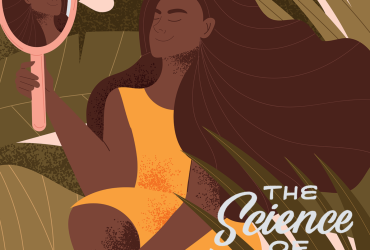
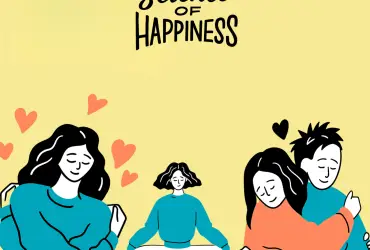
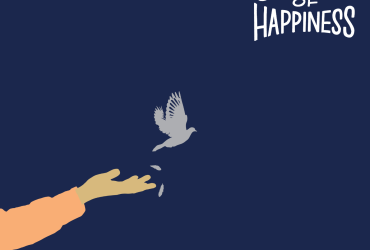

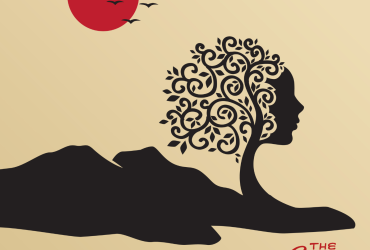
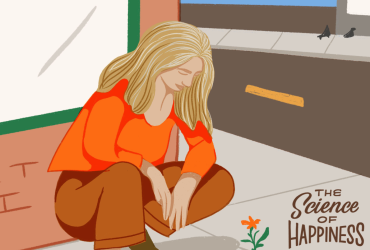
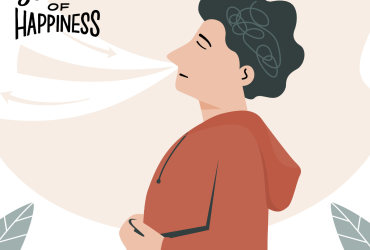
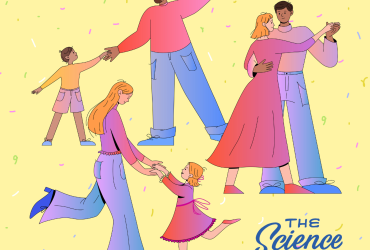
Comments